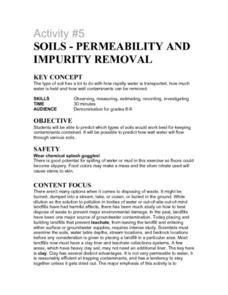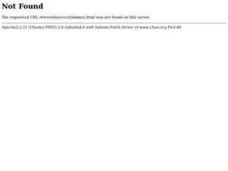Curated OER
Human Impact on Water Quality
Students identify at least three common repercussions of developing water front property on water quality. They describe three sources of water pollution. They research the organism striped bass and observe it if striped bass is available.
Curated OER
Predicting the Past
Students study how archaeologists record the past. They discuss archaeology and artifacts. They view a list of artifacts discovered by Marquette at the Illinois Village and answer questions regarding them. They complete a test about...
Curated OER
Activity #5 Soils-Permeability and Impurity Removal
Middle schoolers predict which types of soils would work best for keeping contaminants contained. They comprehend that in the past, landfills have been one major source of groundwater contamination. Pupils comprehend that placing and...
Curated OER
Land Use Issues
Students discover seeds are a source of life. They also label the parts of a seed and examine the conditions which are needed for the seed to start growing. They follow the life cycle of seeds.
Curated OER
Make Way for Wild Migrants
Students discuss the threats facing migratory species and track the seasonal journeys of wildlife in real space and in cyberspace. Once they have gathered information from several sources, they create a portfolio to share with others...
Curated OER
What Do Concentrations Mean?
Students investigate the concept of climate gases and practice using the appropriate measurement terms. The lesson includes information that is used by the teacher to conduct class discussion or as a source of background for students.
Curated OER
The Whole is More Than Half
Students explore number sense by completing a food related fraction activity. In this parts of a whole lesson, students utilize a graham cracker to divide and identify what a quarter, third, or half looks like. Students eat their snack...
University of Georgia
Splat!
What does viscosity have to do with splatter? An activity shows that the viscosity of a substance is inversely proportional to the distance of its splatter. Learners conduct the experiment by collecting data, graphing, and analyzing the...
Louisiana Department of Education
Hatchet
Accompany a novel study of Hatchet by Gary Paulson with a unit consisting of 16 lessons focused on physical and emotional survival. Reading the story along with a variety of informational texts, scholars compare and contrast reading...
Louisiana Department of Education
Out of the Dust
The Grapes of Wrath may be the most famous novel set during the Dust Bowl, but what other stories cover the same time? The unit focuses on the Karen Hesse novel Out of the Dust. Learners keep a timeline of the Dust Bowl, maintain a...
Curated OER
Water
Students examine water, its function and how much you should consume. In this water lesson plan students study water and why it is important, how much you should drink and what its functions are in your body.
Curated OER
Primary Productivity in Headwater (deciduous Dominated) Streams in Winter
Students study outside sources of energy that are associated with the headwater streams in northern Michigan. They study how leaf fall is an important food source for macroinvertebrates and how photosynthesis drives the production of...
Curated OER
Termite trails
Students observe termite trail-following behavior. Termites tend to follow lines made on paper by ballpoint pens because the ink contains a chemical that is similar to the trail pheromones used by termites to lead colony members to food...
Curated OER
What is Money? Learn the Role of Money in a Free Market System
Pupils view a seashell and listen as the teacher explains that these were sometimes used as money. They listen as the teacher lectures on medium of exchange, barter, and commodity. Students determine the number of chickens it would take...
Curated OER
Where Does It Come From?
Students research agricultural commodities. In this agricultural commodities activity, students read background information about food products and commodities. Students complete worksheets with specific product information including its...
Curated OER
DNA Blueprint for Life
Students isolate DNA from different food sources. In this biology instructional activity, students research DNA extraction. They analyze DNA stands collected from the lab, and compare the differences between each.
Curated OER
Enjoying Carrots
Learners examine how carrots are a good source of Vitamin A. They discover how a specific food helps make a specific part of the body healthy. They listen to a read aloud of Ruth Krauss', The Carrot Seed.
Curated OER
Unit: Processing and Manufacturing: Examination Three
StudentsMatch the vocabulary terms in column A with the definitions in column B. Write the letter of the definition in column B in the space next to the terms in column A. Afterwhcich, students Write short answers or fill in the blank to...
Calvin Crest Outdoor School
Survival
Equip young campers with important survival knowledge with a set of engaging lessons. Teammates work together to complete three outdoor activities, which include building a shelter, starting a campfire, and finding directions in the...
NOAA
Ocean Primary Production
A cold seep is an area on the ocean floor where hydrocarbons leak from the earth, creating entire unique biomes. Learners explore cold seeps, photosynthesis in the ocean, and its limitations due to loss of sunlight. They further explore...
Curated OER
Sinking Races
Students build plankton models and compete to see which sinks most slowly. They write, or orally present ,the adaptations they incorporated to slow the sinking rate of their organisms. Race results can be grounds for some prizes!
Curated OER
Foodborne Illness Outbreak Investigation
Students demonstrate how epidemiological investigations of outbreaks are performed. They illustrate the principles of hypothesis formation and testing by epidemiologic study in the setting of an acute foodborne disease outbreak.
K12 Reader
From Nomad to Farmer
The gradual evolution of the earliest settlers in North America from nomads to farmers is the subject of a reading comprehension learning exercise that asks kids to answer a series of questions using information provided in the reading...
Curated OER
Animal Habitats
Elementary schoolers complete a learning exercise that has them decide which of four environments a variety of animals live in. The environments are: pond, soil, ocean, and woodland. There are 12 different types of animals that pupils...
Other popular searches
- Food Sources
- Food Origins
- Aboriginal Food Sources
- Esl Food Sources
- Food Origins Of
- Science Sources of Food

























